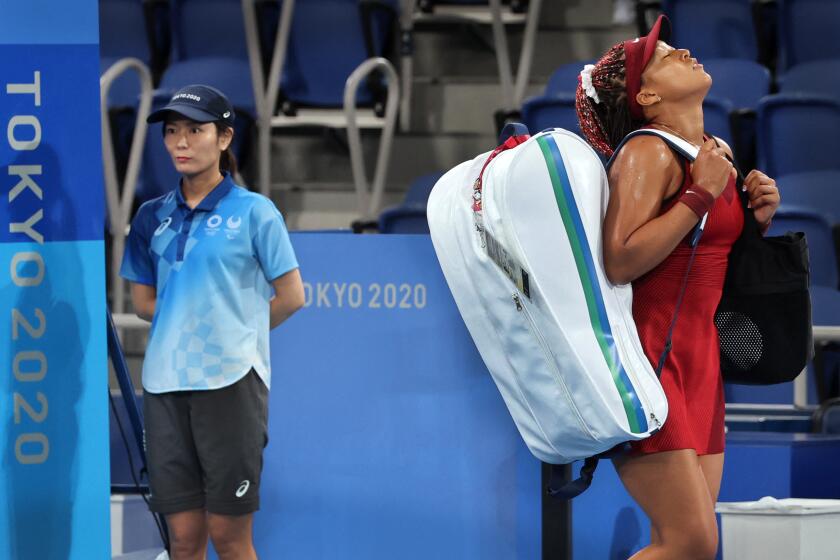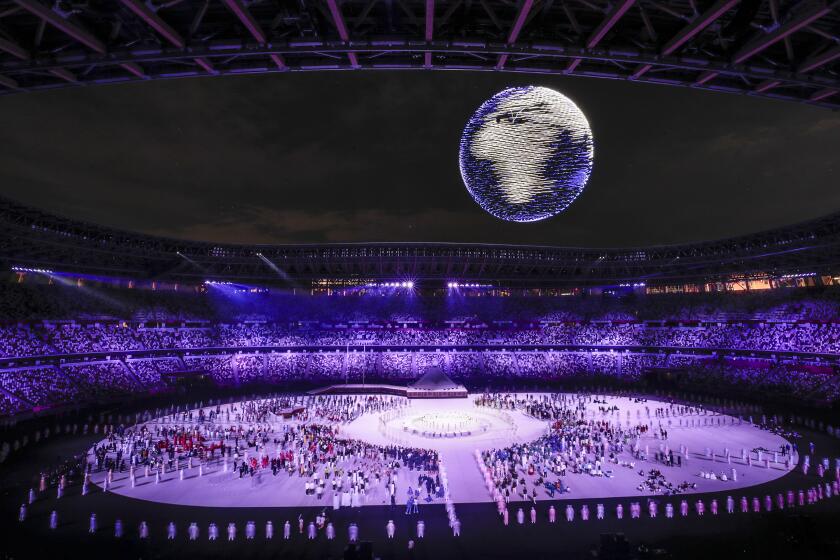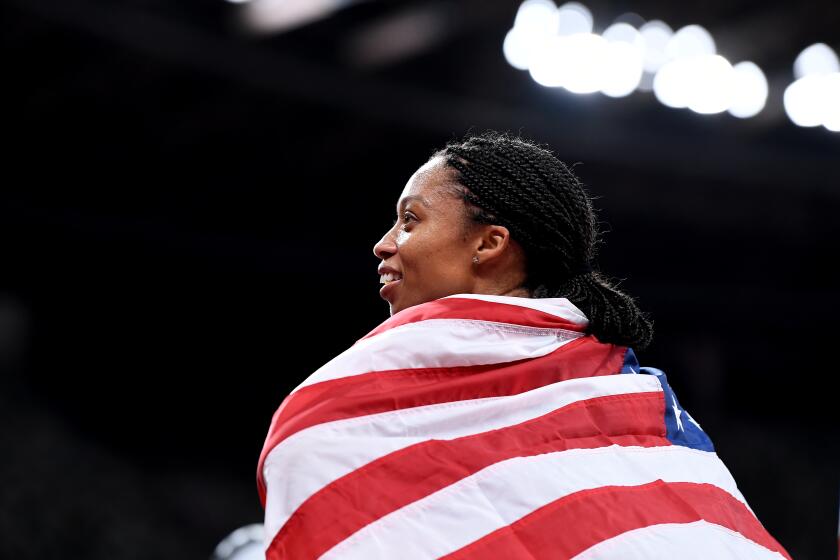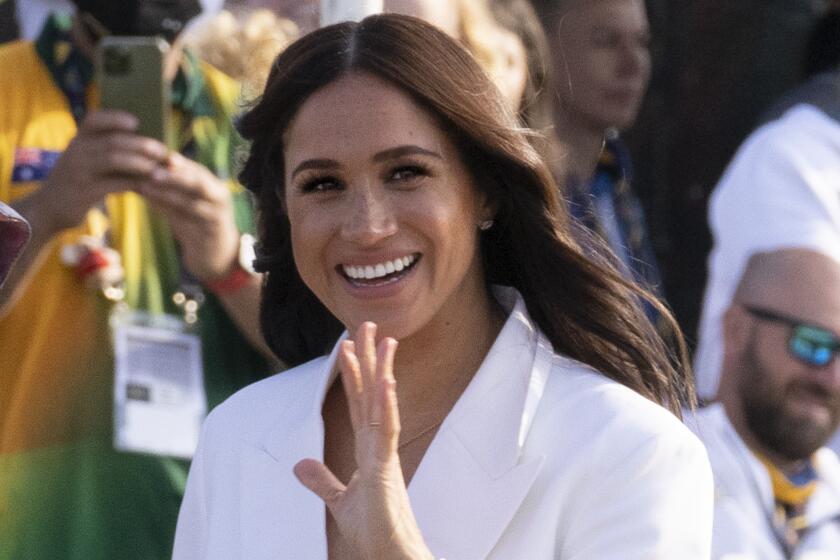The Olympics you’re nostalgic for are over. And it’s not because they’re ‘woke’
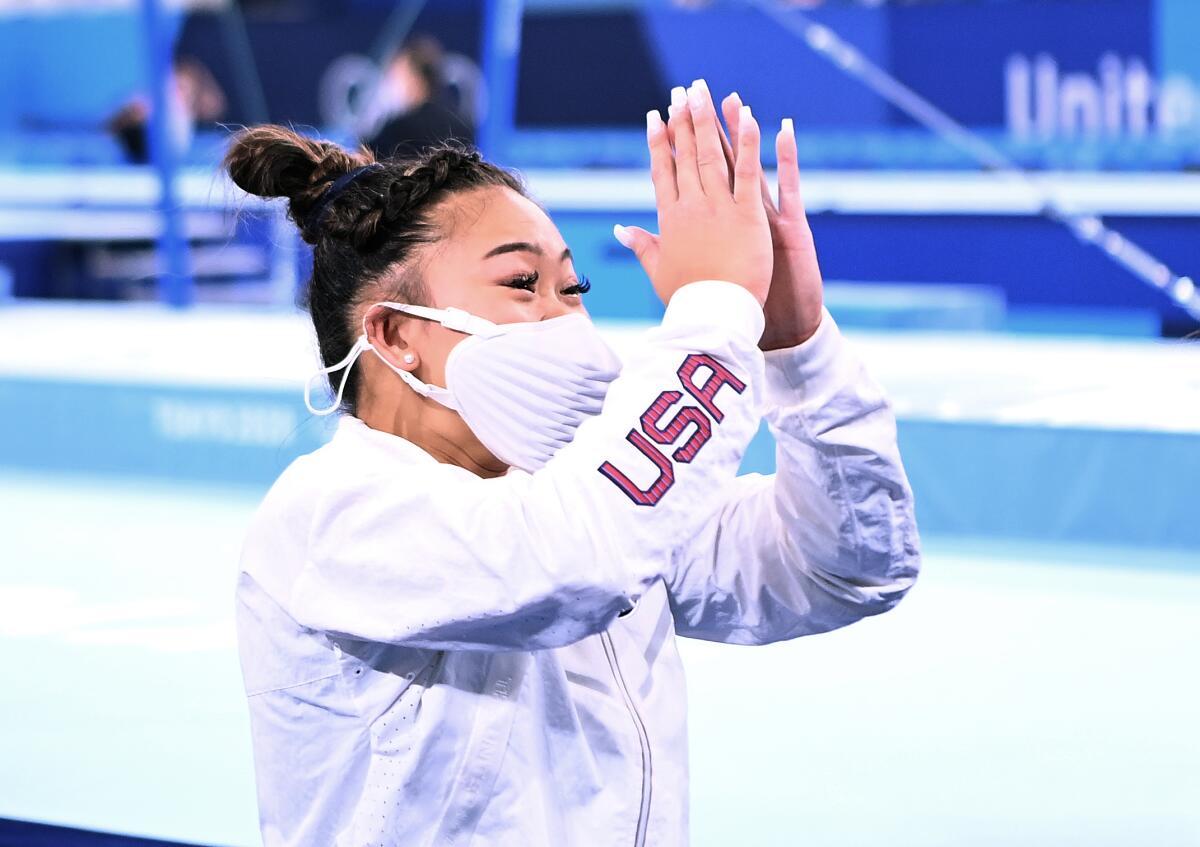
- Share via
Heading into the Tokyo Olympics, the word on most everyone’s lips was “controversy.”
From protests in Japan against holding the Games in the midst of the COVID-19 pandemic to questionable — and arguably racist and sexist — decisions by the governing bodies of multiple Olympic sports regarding cannabis use, approved competition apparel and more, no recent Olympics have begun under as dark a cloud as these.
As we near the event’s halfway mark, though, the drama thus far has been mostly kept to the pool, the court and especially the gymnastics arena, with Simone Biles’ exit from the women’s team and individual all-around gymnastics competitions dominating the headlines. Has the unpredictability of sport eclipsed the potential for controversy that marked the lead-up to Tokyo? Or is media coverage of the Olympics, especially from U.S. TV rights-holder NBC, viewing the event through rose-colored glasses?
Times TV editor Matt Brennan, senior writer Greg Braxton and staff writer Tracy Brown, who have been keeping a close eye on the Games from home, discuss the tension between Olympic spectacle and Olympic reality:
The Times TV team discusses watching an often deflating, thoroughly chaotic Olympics — and why NBC’s approach to televising it is part of the problem.
Tracy Brown, staff writer: With the rising number of confirmed COVID cases and the low vaccination rate in Japan, I was already pretty wary about the Tokyo Olympics in the weeks leading up to the opening ceremony.
Then came headline after headline of various sports agencies seemingly failing their athletes — particularly women — starting with sprinter Sha’Carri Richardson’s disqualification from the Olympic track team for an archaic rule banning marijuana (a substance that is legal in many states). Almost immediately after came the news that the use of swim caps designed for Black natural hair would not be allowed at the Games. Then the story about the Spanish Olympian who had to leave her breastfeeding child at home.
Among the most shocking is the report about a fencer accused of sexual assault who still traveled to Tokyo as an alternate on Team U.S.A., against the protests of his teammates, with a “safety plan” that had to be created to keep him away from women. (And that’s not even getting into the controversies around the composer and the director of the opening ceremony, who both came under fire for past problematic behavior mere days before the event, or any Tokyo protests.)
But once the competitions were officially underway, the TV broadcasts have more or less felt like the Olympics as usual. The stories we get on TV have primarily been about highlighting individual athletes and their achievements, with familiar produced packages about their journeys to sit-down interviews following events. And even with the time difference and difficulties in navigating how to watch these Games, it’s been very easy to get caught up in the drama of the sports — from inspirational 13-year-old skateboarding phenoms and other history-making winners of events that I suddenly care about because it’s the Olympics, to the heartbreaking upsets.
I’ve watched most of the Games live online or as full events on NBC-affiliated cable stations rather than the flagship’s prime-time block, so most of the reminders of the real world outside the Olympic bubble have come in the form of passing comments or the images of people wearing masks, the empty stands and the occasional long-distance high-fives. And I understand that these athletes deserve the spotlight as they are striving to achieve their once-in-a-lifetime dreams. But as someone plugged into the news I can’t help but feel like there is a big disconnect between what we are seeing on TV and the reality of everything outside the bubble. How has the experience been for you both?
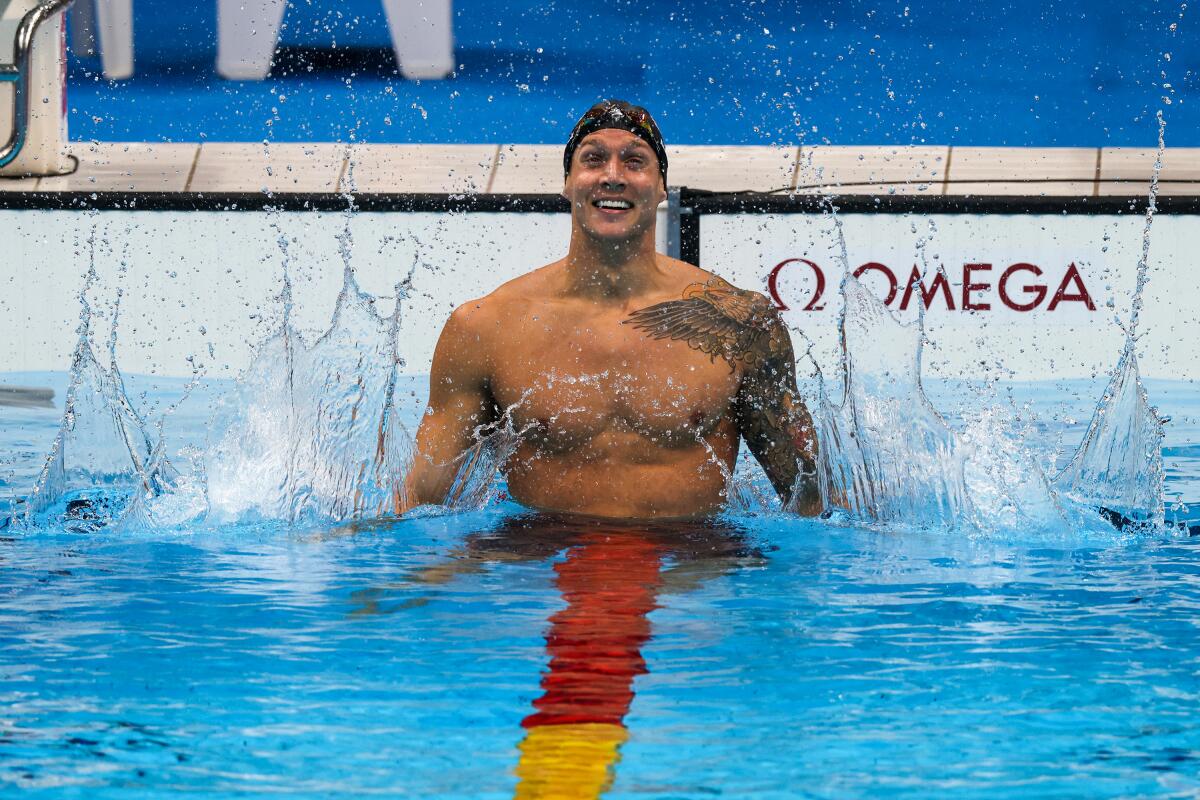
Matt Brennan, TV editor: At least during the day, when the lion’s share of my attention is devoted to the stories we’re publishing, I’ve had to watch the Olympics mainly via Twitter, which only amplifies the disconnect you describe, Tracy. Alongside celebrations of Hmong American gold medalist Sunisa Lee, for instance, — who topped gymnastics’ all-around podium about 14 hours before it aired, on tape delay, in U.S. prime time — you might encounter updates about the Delta variant, the Jan. 6 commission, the looming end of the eviction moratorium and an infinite array of other news items that break the Olympic spell. And at least for me, that makes it harder to relish the genuinely feel-good moments, like U.S. swimmer Caeleb Dressel becoming emotional about his separation from his family during “a really tough year” training for the Games.
Part of the problem is the strange position of any network televising the Olympics. Is it entertainment? Sports? News? All of the above? As the Washington Post’s Paul Farhi reported this week, NBC, like CBS before it, has devoted many more minutes to the Games during its news broadcasts than its rivals, and as long as I can remember has approached the Olympics with a kind of boosterism that feels increasingly out of step with the event’s reputation.
After a dreadful run-up to the Tokyo Olympics, the hosts acknowledged the sober moment of their opening with dignity and grace.
At least since Salt Lake City in 2002, the International Olympic Committee — and the leaders of local bids — have been under some level of scrutiny as to how the Games are awarded, and the sense that the Olympics mean immense investment but paltry reward for host cities has only deepened in recent years. (L.A. itself is a seat of Olympic skepticism heading into 2028.) It frankly feels ickier now to be rah-rah about the Olympics than it used to be, and the telecasts of Olympic events rarely even nods at those qualms, much less explore them in detail.
Which brings me to one last thought. We received an outpouring of responses to our last roundtable, most of them echoing our complaints about the viewing experience, and one throughline I’ve noticed in those responses, as well as my conversations around the (virtual) newsroom, is nostalgia. I think what we are yearning for, in sports, entertainment and beyond, is the kind of late-1990s, early-2000s monocultural moment when we could all be talking about the same thing at the same time. It’s something I wrote about when Michael Jordan docuseries “The Last Dance” premiered, but I sense that the yearning has only intensified in the last year-plus, as anti-maskers and anti-vaxxers, QAnon believers, election fraud hucksters, cable news hosts and others have shown the fragmentation to be even more dire. For a long time, the Olympics bucked the trend, but I think Tokyo will be remembered as its swan song.
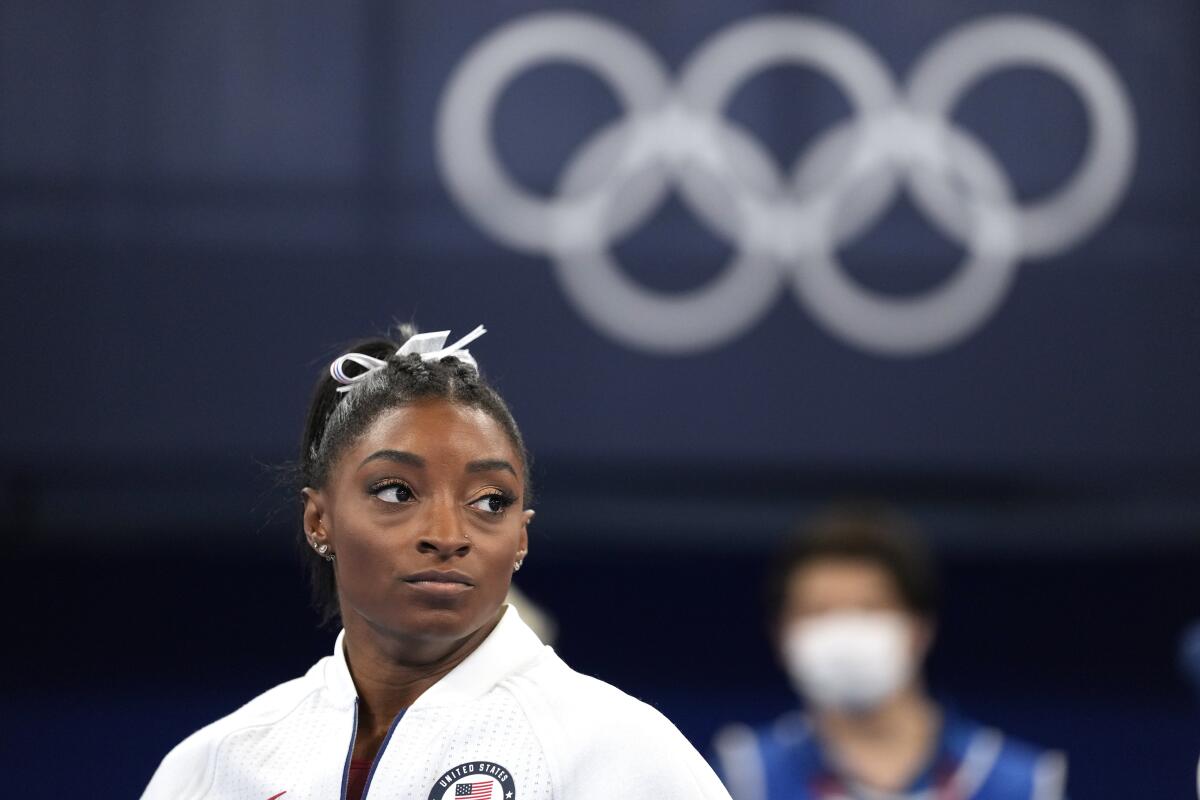
Greg Braxton, senior writer: I find the question of what the Olympics is truly fascinating and complex. But one elephant that has been in the room and largely ignored by the coverage is the dark side of racism surrounding these Games — a dark side that may be inseparable from the surprising early loss of Naomi Osaka and the stunning withdrawal of Simone Biles.
Both are phenomenal athletes. Both are activists who have shown solidarity with Black Lives Matter. And both have come under attack by conservatives infuriated by “wokeness” in sports. The pile-on was bubbling even prior to Osaka lighting the Olympic torch thanks to the continuing racially charged musings of Megyn Kelly, and reached a kind of fever pitch after Simone pulled out. It was straight-up bullying, and while color was not mentioned, it was clearly in the heart of the attackers. I doubt if any elite white athlete who did what Simone did would have come in for that degree of nastiness. And I feel that is a legitimate news development that has been glossed over by the television coverage. That’s unfortunate.
News, results and features from The Times’ team of 12 reporters who covered the Tokyo Olympic Games in the summer of 2021.
Even if we grant the desire to keep the energy of Olympic coverage positive, more could be done to bring in real-world context. There was an opportunity during Suni’s triumph Thursday, for instance, to point out its importance during a time in our country when anti-Asian hate has spiked to terrifying extremes. But once again, there seemed to be no real effort to make that connection, even though there are dozens of NBC personnel who could have done so.
It’s very encouraging that there was such overwhelming support from seasoned athletes and others for Biles’ bravery. And to see her enthusiastically cheering on her teammates despite whatever personal battles she is facing moves me deeply. But the Olympics, especially this year, do not take place in a bubble. The real world exists, and there should be more of an effort to celebrate the achievements of athletes of color and what impact their achievements will have on not just representation in sports, but also culture and even politics. For all the evidence that the Olympic audience is in decline, it remains the most-watched event on TV at the moment, and thus a chance to bring stories about overcoming systemic racism and emerging victorious to members of the audience who may not otherwise encounter them. But even more emphasis needs to be put on highlighting those stories to make a dent.
Just bringing up this point is bound to make those who are racist, or feel that there is too much focus on the importance of diversity, rush to their keyboards and fire off vile remarks. Save your energy, folks. I know how you feel — and I don’t have the appetite to keep hitting the delete button.
More to Read
The complete guide to home viewing
Get Screen Gab for everything about the TV shows and streaming movies everyone’s talking about.
You may occasionally receive promotional content from the Los Angeles Times.
